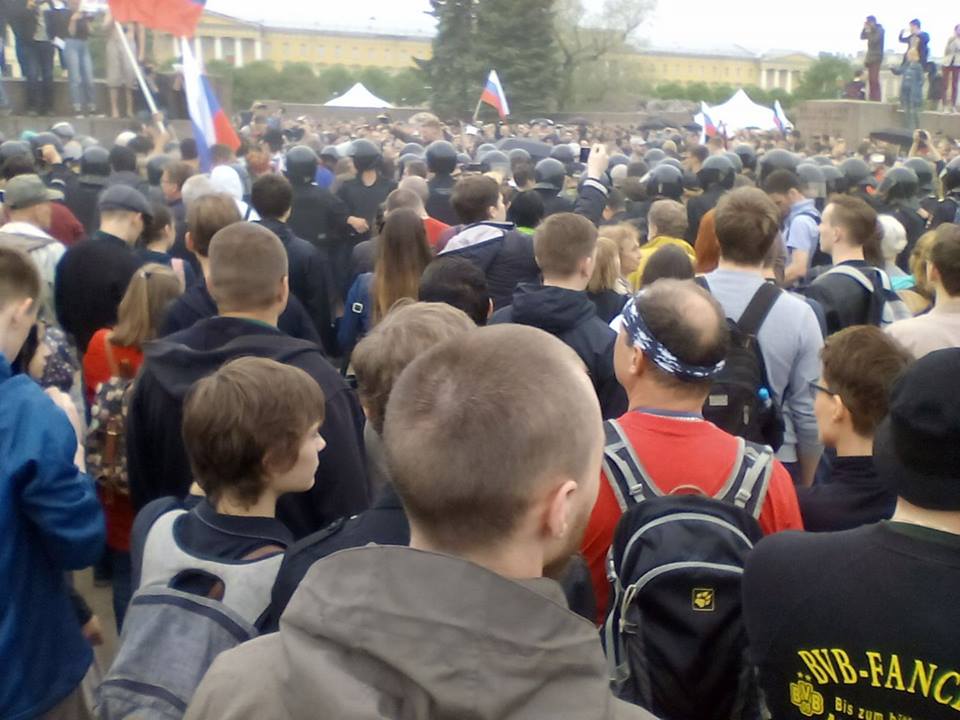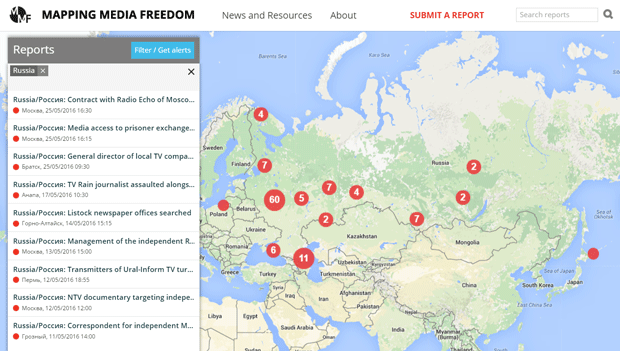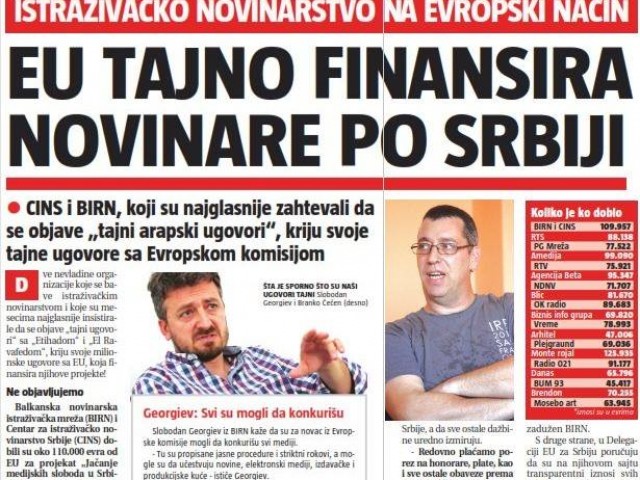15 Jun 2017 | Campaigns -- Featured, Russia, Statements
[vc_row][vc_column][vc_column_text]

Protesters in St. Petersburg demonstrated against corruption in Russia (Photo: Andrey Kalikh)
Over 1,500 protesters were reportedly detained by riot police on 12 June 2017 during anti-corruption demonstrations in cities across Russia. The demonstrations were called by Alexei Navalny, a prominent critic of the Russian government.
Journalists detained include Mapping Media Freedom’s Russia correspondent Andrey Kalikh, was held until the eve of the 13th and is currently facing 10,500 ruble fine (160 euros). Russian journalists Ksenia Morozova and Andrey Poznaykov, photographer David Frenkel, and Spanish reporter Ignacio Ortega were also detained after showing their press credentials.
Activist and Index Freedom of Expression winner Ildar Dadin was also detained and reported that he was beaten while in custody after the protests. Police also threatened to put a plastic bag over his head.
“The mass detainment of protesters, journalists and their alleged mistreatment by security forces clearly violates multiple articles of the European Convention on Human Rights”, said Hannah Machlin, project manager, Mapping Media Freedom at Index on Censorship. “These detentions show how repressive and intolerant the current regime is toward free speech.”
Index on Censorship calls on the Russian authorities to respect the right to freedom of assembly and freedom of expression, immediately release and drop all charges against demonstrators and journalists.
Authorities in Moscow said Monday’s protest was illegal and arrested Navalny when he tried to leave his home that morning. [/vc_column_text][/vc_column][/vc_row][vc_row][vc_column][vc_basic_grid post_type=”post” max_items=”12″ style=”load-more” items_per_page=”4″ element_width=”6″ grid_id=”vc_gid:1497944483848-d02328db-81e9-7″ taxonomies=”6534″][/vc_column][/vc_row][vc_row full_width=”stretch_row_content_no_spaces” content_placement=”middle”][vc_column][vc_single_image image=”91122″ img_size=”full” alignment=”center” onclick=”custom_link” link=”https://www.indexoncensorship.org/2017/05/stand-up-for-satire/”][/vc_column][/vc_row]
1 Dec 2016 | Press Releases

Moddi (Photo: Jorgen Otay)
Free speech campaigners Index on Censorship will host a night of forbidden music on December 7 to raise money for censored artists.
This candlelit evening features songs that have been banned or censored, which will be performed live by award-winning Norwegian musician Moddi to celebrate the launch of his ‘Unsongs’ album — 12 tracks from global artists, including Kate Bush and Pussy Riot. The one-off event will be hosted in the restored Hoxton Hall, one of the East End’s hidden Victorian gems.
Moddi’s collection unfurls stories of censorship, persecution and repression, such as A Matter of Habit, a song inspired by interviews with Israeli soldiers and which was banned from army radio in 2012.
Also included in the set will be Moddi’s version of Punk Prayer, which gained international notoriety after Russian feminist punk band Pussy Riot staged a performance of the song at Moscow’s Cathedral of Christ the Saviour. The group said it was a protest against the Orthodox church’s support for Russia’s President Vladimir Putin. Three members of the group were sentenced to two years in prison for “hooliganism motivated by religious hatred”.
Earlier this month Moddi pulled Punk Prayer from his set at a festival in Finnmark, Norway’s northernmost county on the border with Russia, after Russia’s Consulate General in expressed concerns about the song being performed.
‘Forbidden Songs’ is a festive fundraiser in support of freedom of expression charity Index on Censorship, which champions musicians, artists and others around the world who are facing censorship and repression. All proceeds from the night will go to support Index’s Freedom of Expression Awards Fellowship supporting persecuted artists, journalists and campaigners.
Previous award winners include hip-hop artist Smockey, from Burkina Faso, whose studio has been repeatedly targeted for attack because of his involvement with a campaign for democratic reforms that ousted the country’s long-serving and dictatorial president.
Tickets for the event are £15 and include a free drink courtesy of Flying Dog Brewery.
For more information or to arrange an interview, please contact Helen Galliano [email protected]
Notes to Editors
What the critics say about Moddi:
“Making banned music dangerous once again.” The Independent
“An eye-opening lesson in the importance of music” Mojo
“A brave, thought-provoking, musically adventurous project” The Quietus
“Music still has the power to confront authority” The Guardian
“Witty and spry” Financial Times
Index on Censorship campaigns for and defends free expression worldwide. We publish work by censored writers and artists, promote debate, and monitor threats to free speech. We believe that everyone should be free to express themselves without fear of harm or persecution – no matter what their views.
www.indexoncensorship.orgModdi & Unsongs
Unsongs is a remarkable collection of songs that have, at one stage, been banned, censored or silenced. The attempts to suppress them were as mild as an airplay ban and as brutal as murder. With great sensitivity and imagination, Norwegian singer-songwriter Moddi has given them new life and created a moving and eye-opening album. Unsongs simultaneously celebrates the censored and exposes the censors.
2 Jun 2016 | Mapping Media Freedom, News, Russia

In Russia, business interests are protected by the state. When human rights violations or environmental damage are reported, nepotism and corrupt dealings between officials and business usually plays a large role. In these cases, no matter how serious the allegations or how strong the evidence, business owners skirt trouble while journalists and bloggers face real problems.
When copper and nickel ore deposits were discovered on the banks of the Khopyor River near a nature reserve in the Voronezhskaya oblast in 2012, the Ural Mining and Metallurgic Company (UGMK) was selected to exploit the deposits. Local residents and environmentalists protested when the company began prepping the site for extraction. Opponents were convinced that the development would cause environmental damage to the reserve and the river. Despite the objections, regional authorities granted UGMK permission to proceed with the project. In summer 2013 protests turned violent with clashes between the protesters and police and security hired by the company.
Research conducted by environmental activists and journalists uncovered alleged ties between UGMK’s owners, Iskander Makhmudov and Andrey Bokarev, and Kremlin-connected businessmen including Gennadi Timchenko and Vladimir Yakunin, close friends of the Russian president Vladimir Putin. The investigators also disclosed the involvement of several European companies.
Following the disclosures, two local activists, Mikhail Bezmensky and Igor Zhitenev, who published the information were accused of attempting to solicit a bribe from the company in order to halt the protests. Both were arrested and jailed. One more blogger, who faced threats, fled Russia and received political asylum in the EU.
Local mass media controlled by the department of property relations of the Voronezh region began spreading the allegation that a group of outsiders was trying to destabilise the situation. A Volgograd MP and businessman Oleg Pakholkov, sponsored by UGMK, launched Khozyaistvo Chernozyemya, a weekly newspaper with a circulation of about 60,000.
The paper routinely devoted five or six pages to laudatory coverage of nickel mining on the Khopyor, while the public protests were presented as a dirty competitive technique, an anti-state provocation, or a personal PR campaign of the protest activists. Other articles were about the positive experience of the Ural Mining and Metallurgic Company, the benefit of the project for the regional economy and its environmental safety.
Despite the ongoing protests mounted by opponents and periodic disclosures of corruption revealed by independent investigations UGMK continues to work on extracting the ore. The local activists still hope that Russia’s economic crisis, the collapse of commodity prices and their protests will help them stop the mining.
The UGMK investigations is just one example of the potential risks that journalists and bloggers face when they start publishing about Russia’s businesses.
In fact, a considerable part of the media rights violations in Russia reported to Mapping Media Freedom are against journalists who are prevented from reporting about corporations.
Officials and Putin-connected business owners who have been named in the Panama Papers leak have so far received full protection in the Kremlin-backed media while independent journalists and bloggers who reported on the disclosures have been accused of “undermining Russian interests for Western money” and face legal charges.
Aleksei Navalnyi, an opposition leader and the author of dozens of high-profile investigations into misconduct and corruption committed by state corporations has been charged three times since 2012 with crimes that he has not committed, including defamation and fraud.
The state has almost officially recognised that Navalnyi has been persecuted for his investigations. In 2013 Vladimir Markin, a spokesperson for Russia’s investigative committee, told the pro-Kremlin newspaper Izvestia that accusations against Navalnyi would not have been raised had the blogger not “teased power”.
In the last two months, three cases of journalists being targeted by corporate interests have been reported to Mapping Media Freedom.
On 12 April, while covering truckers who were protesting against the actions of transport company Omega, its director Evgeni Rutkovski attacked journalist Anton Siliverstov. When Siliverstov asked Rutkovski to comment on the protest, Rutkovsky forced Siliverstov from the office. The journalist said he would record the incident on his phone, at which point Rutkovski snatched the journalist’s device, refused to give it back and called security.
Two days later, reporter Igor Dovidovich was assaulted by the head of Gaz-Service, a gas company he was investigating. His TV crew was also attacked by the firm’s employees.
The month ended with state oil company Rosneft filing a judicial complaint against BiznessPress for an article which, the firm said, is “false and represents baseless fantasies of journalists or their so-called sources”.
Without support from news organisations or media laws to look to for protection, bloggers are often more vulnerable than journalists. While those reporting these crimes are often defenceless, those committing them often benefit.
6 Jan 2016 | Mapping Media Freedom, mobile, News, Serbia

It was a Wednesday morning in early November when investigative journalist Slobodan Georgijev opened Informer, one of Serbia’s notorious tabloids. He had just arrived at his office, the newsroom of Balkan Investigative Reporting Network (BIRN), one of Serbia’s few independent media outlets. When he turned the page he was shocked by what he saw; a picture of his own face amongst two others, in an article calling three media outlets known for critical reporting of the Serbian government, including BIRN, “foreign spies”.
“It was funny and unpleasant at the same time,” Georgijev recalled, speaking to Index on Censorship. “Funny because I knew that this is just a campaign by Informer to undermine the credibility of independent journalists.” More importantly, he had begun worry about his own safety. “It’s also unpleasant because you never know how people will interpret such defamations.”
Several independent media houses — including BIRN, as well as Crime and Corruption Reporting Network (KRIK) and Center for Investigative Journalism Serbia (CINS) — have alleged that pro-government tabloids like Informer are running a smear campaign against them.
The first major incident followed the publication of a story about the cancellation of Prime Minister Aleksandar Vucic’s vacation in August 2015. Informer published an article saying that Vucic was forced to cancel his two day vacation in Serbia due to reporters from BIRN and CINS allegedly booking a room next to his.
The same newspaper also wrote that BIRN and CINS were meeting with European Union representatives on a weekly basis to plan to bring down the government.
“We are basically accused of being financed by the EU to work against our government,” Branko Cecen, director of CINS, told Index on Censorship. Cecen, like Georgiev, was also pictured and called a foreign spy in Informer. “Expressions like ‘foreign mercenaries’ and ‘joint criminal activity against their own state’ have been used.”
Informer newspaper is openly affiliated with the Serbian Progressive Party (SNS) of prime minister Aleksandar Vucic and has frequently been accused of political bias in favour of the party and the prime minister.
CINS, KRIK and BIRN have long reported on what they see as a slew of regular negative articles about themselves in tabloid newspapers with close ties to the government. There is no doubt that the three news outlets are targets because of their critical reporting on the government.
One of BIRN’s stories revealed a contract the Serbian government had signed with the national carrier of United Arab Emirates, Etihad Airways, to take over it’s state-owned counterpart Air Serbia. The deal had been financially damaging for Serbia, which was kept from the public until BIRN obtained and published the contract.
Another story investigated alleged corruption concerning a project for pumping out a flooded coal mine. BIRN found out that Serbia’s state-owned power company had awarded a contract to dewater the mine to a company who’s director is a close friend of the prime minister.
The coal mine revelations led to an angry speech about BIRN by Vucic on national television saying: “Tell those liars that they have lied again(.”
He also attacked the EU delegation in Serbia for being involved in discrediting the government by financing BIRN. “They got the money from Davenport and the EU to speak against the Serbian government,” the prime minister said, naming Michael Davenport, the head of the EU delegation in Belgrade.
BIRN’s editor-in-chief Gordana Igric told Index on Censorship she sees a resemblance to Serbia’s difficult nineties. “This reminds me of the regime of Slobodan Milosevic, a time when the prime minister also had a prominent role and critical journalists and NGOs were marked as foreign mercenaries,” she said. “What’s happening in Serbia today makes you feel sad and confused.”
Independent journalists find the path that the prime minister is taking alarming. Some compare him with the Turkey’s Recep Tayyip Erdoğan or the Russia’s Vladimir Putin. According to Cecen, the level of freedom of expression is at the lowest level since the time of strongman Milosevic. “There is an aggressive campaign against anybody and anything criticising the prime minister and his policies”, he said. “The prime minister has taken over most media in Serbia, especially national TV networks, but also local ones. His small army of social media commentators is terrorising the internet. It is quite bleak and frustrating.”
Regardless of Vucic’s verbal attacks towards the EU delegation, Serbia has opened the first two chapters in its EU membership negotiation in December 2015. This represents a big step towards eventual membership of the European Union. But the latest progress report on Serbia (November 2015) says the country needs to do much more in terms of fighting corruption, the independence of the judiciary and ensuring media freedom.
“The concern over freedom of expression is always expressed in these reports,” Cecen said. “But we see no influence of such reports since situation with media and freedom of expression is deteriorating daily.” Cecen is disappointed in the European Union’s support for independent media in Serbia and finds that EU officials show too much support for the Serbian government and the prime minister.
After he had seen his own face in the paper, Georgiev picked up the phone and called up Informer’s editor-in-chief Dragan Vučićević to ask for a better picture in the next paper. Georgiev jokes about it and clearly doesn’t let accusations and threats hold him back. “People around me are making jokes”, he said. “They call me a foreign mercenary, an enemy of the state.”
Georgiev pressed charges for defamation against Informer. “We are living in a state of constant emergency,” he continued, concerned about the state of press freedom in his country. “Serbia is not like Turkey. But it goes very fast in that direction.”
Mapping Media Freedom
Click on the bubbles to view reports or double-click to zoom in on specific regions. The full site can be accessed at https://mappingmediafreedom.org/
|




